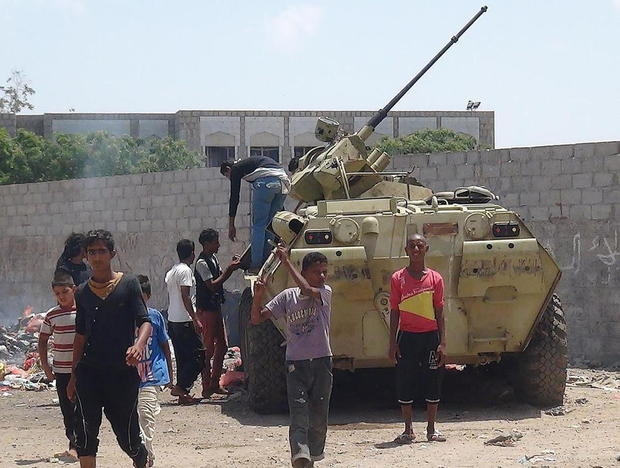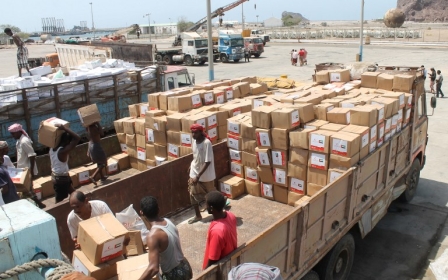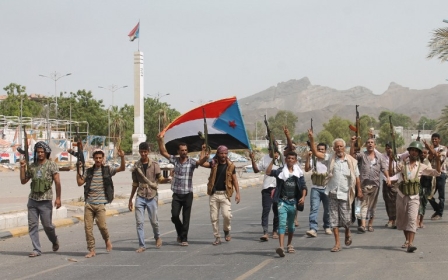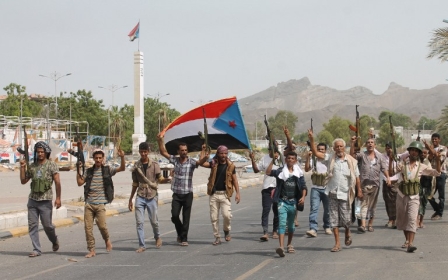Despite victory, northern people afraid to return to Aden

SANAA - When the war between the Houthis and Popular Resistance fighters in Aden broke out in late March, Aden's residents started to flee the city for other - provinces and countries.
The number of displaced people from Aden reached to more than 900,000 by the end of June, according to the Deputy of Aden Province, Naif al-Bakri.
Not all of the displaced people are originally from Aden. Many were originally from the Northern provinces but had long ago relocated to find work in Aden.
In the past week, the Southern Popular Resistance movement, with the help of the Saudi-led coalition, cleared Aden of Houthi fighters, expelling them from Aden province.
Essam al-Shaeri, the under-secretary of the Aden-based Sah Foundation for Defending Rights and Freedoms, told Middle East Eye that Aden is starting to return to normal and that basic goods are available again in Aden.
New MEE newsletter: Jerusalem Dispatch
Sign up to get the latest insights and analysis on Israel-Palestine, alongside Turkey Unpacked and other MEE newsletters
"There are basic goods in Aden right now, but the city still needs rebuilding as many of the governmental buildings, places of business and even residential houses were damaged by the Houthis. We are still waiting for construction," al-Shaeri said.
The news of these developments was glady recieved by many, including the Yemeni government based in Riyadh.
Northern people fear to return
But despite the news of progress in Aden, many of its residents from the North who fled the city fear the repercussions from their Southern neighbours, who accuse them of disloyalty.
Abdulrahman Iskandar, 27, a driver with a local company in Aden, is originally from Taiz but he has been working in Aden since 2008. He fled the city in the beginning of April due to the war.
"When I heard that Aden was free of Houthis, I was so happy and ready to return. But when I contacted my friend in Aden he advised me not to come back to Aden because Adenis will not let Northern people live there," he explained to MEE.
Iskandar has never supported the Houthis and his only sin that he is from the North. The bitterness fostered through this war has pushed residents of Aden to escalate their demands for separation.
"I am not with Houthis but I want to work. I am responsible for a five-member household. It is so difficult to find work nowadays, but in Aden I have work. That is why I want to come back to Aden," said Iskandar.
Saleh Adbulhamid, an Adeni resident, told MEE that Adenis and Southern people in general don't trust Northern people anymore, because some of them worked as spies with the Houthis during the war.
"We in Aden know some Northern people who used to be beggars, and then we realised that they gave information to the invaders [Houthis] about the Popular Resistance," he added.
Abdulhamid said that there must be further discussion about segregating the North from the South.
The first step towards separation
A decision issued by President Abd Rabbuh Mansour Hadi on Thursday stated that the Ropular Resistance in Aden would integrate with the legal army as a new step to build a loyal army for the Yemeni government based in Riyadh.
The Popular Resistance in Aden has not welcomed the decision yet, and there has been more than one response from the Southern movement.
Maged al-Shoaibi, a member of the media team of the Popular Resistance in Aden, told MEE that the group's leadership must replace the leadership of the army in the South.
"We do not trust the Yemeni army that killed us in this war, so it is difficult for the Popular Resistance in Aden to integrate with an army that fought against us. Southern people can form their own army from the Popular Resistance in the south," al-Shoaibi added.
Al-Shoaibi said Hadi's decision is unclear, as he did not explain with which army the Popular Resistance would integrate. "We do not care so much about the decision of Hadi but we need to return our own country in the South," he said.
Fadhl al-Rubaiee, the head of Madar Research Center for Studies based in Aden, told MEE that Hadi should reward the Popular Resistance, as it had a prominent role in clearing Aden from Houthis.
"It is a good decision by the president to integrate the Popular Resistance with the army, but the fear is that the Popular Resistance will try to establish military forces for the interest of separation," he said.
Al-Rubaiee said that there should be a governmental committee that discusses how the government can reward the Popular Resistance, but that this reward cannot have a negative impact on the unity of Yemen.
"The Popular Resistance in Aden has the right to refuse integration with the Yemeni army, because they are only fighting over their own provinces and if they integrate with the Yemeni army they will leave to fight outside of their provinces. This does not serve their interests," al-Rubaiee said.
Displaced people still out of Aden
Although Aden is free of Houthi fighters and basic goods are available, displaced people have still not returned to homes. The entrances of Aden are still under the control of the Houthis and displaced people are still afraid to return.
Wadhah Aidarous, 40, left Aden with his six family members for Sanaa in the beginning of May. When the clashes stopped, he considered returning home, but he cannot trust that clashes will not break out again.
"I know that the Popular Resistance took over Aden but Houthis still control the entrances of Aden and they are still fighting in these areas, such as Alanab Base in Lahj. This means that they could return to Aden at any time," he told MEE.
Aidarous said that under these conditions it is difficult for displaced people to return to Aden. He thinks it is more prudent to remain where he is until the Houthis are far away from Aden or until there is a political agreement that stipulates they withdraw from the provinces.
Regardless, Aidrous is very optimistic that the popular resistance in Aden will expel the Houthis from the Southern provinces. Then, he can return to his home.
Middle East Eye delivers independent and unrivalled coverage and analysis of the Middle East, North Africa and beyond. To learn more about republishing this content and the associated fees, please fill out this form. More about MEE can be found here.




